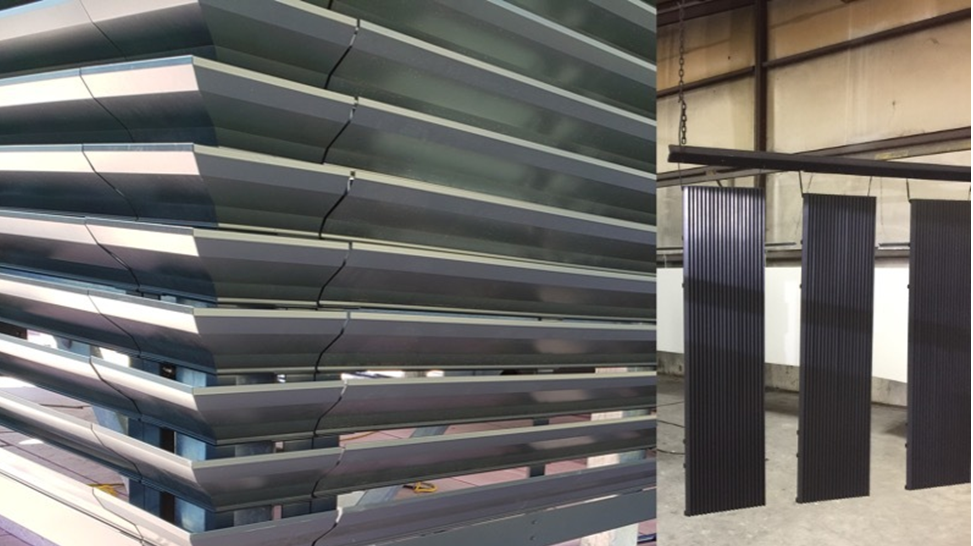
Horizontal vs Vertical Louvers: Choosing the Right Option
Selecting the appropriate louver orientation—horizontal or vertical—is a significant decision in architectural design, impacting light control, ventilation, and energy efficiency. Understanding the unique features and applications of each type allows building professionals to make informed choices that balance functionality and aesthetics.
This article examines horizontal vs vertical louvers, providing insights to help guide your selection.
How Louvers Shape Building Performance
Louvers play a crucial role in regulating environmental factors such as light, airflow, and weather resistance. Their effectiveness depends on how they meet these needs, particularly when comparing horizontal and vertical orientations:
- Light Regulation: Horizontal louvers block high-angle sunlight, ideal for south-facing facades, while vertical louvers are designed to manage low-angle sunlight on east and west-facing walls.
- Ventilation: Horizontal designs promote upward airflow, creating natural cooling in open spaces. Vertical louvers enhance cross-ventilation, particularly beneficial for spaces with consistent airflow demands.
- Weather Protection: Vertical louvers excel at resisting wind-driven rain, while horizontal systems are optimized for shading and solar heat gain reduction.
By addressing these needs, louvers contribute to energy efficiency, comfort, and overall building performance.
Horizontal Louvers: A Focus on Sun Control
Horizontal louvers, arranged parallel to the ground, are integral to energy-efficient design. Their applications extend beyond aesthetics, offering specific advantages for various architectural contexts.
Vertical louvers, characterized by slats positioned perpendicular to the ground, provide distinct benefits for specific conditions and building designs.
Design Considerations
While vertical louvers perform well in many areas, they may allow more heat gain during midday hours when sunlight is overhead. Their upright orientation may also clash with architectural styles that emphasize horizontal design elements.
Beyond orientation, understanding whether adjustable or fixed louvers align with your project’s needs is another critical consideration.
Tailoring Louvers to Your Project with Materials and Customization
The material of a louver system impacts its performance, durability, and aesthetic appeal:
- Aluminum: Lightweight, corrosion-resistant, and versatile, aluminum is a popular choice for most climates and allows for extensive customization in finishes and slat sizes.
Customization options include painted finishes, and perforation patterns, helping architects tailor louvers to meet specific functional and visual requirements.
Energy Efficiency and Sustainability
Both horizontal vs vertical louvers contribute significantly to energy savings.
- Horizontal systems can reduce solar heat gain by up to 23 kBtu per square foot annually on south-facing facades, leading to a reduction in cooling costs by as much as 15%.
- Vertical louvers provide similar benefits for east and west-facing applications, optimizing natural light while minimizing overheating and glare.
- These advantages also support sustainable building practices, such as achieving LEED certification.
Regardless of the louver type you choose, proper maintenance is key to ensuring long-term performance and durability.
Maintenance for Longevity
Proper maintenance ensures louvers maintain their performance and durability:
- Horizontal Louvers:
- Vertical Louvers:
- General Maintenance: Periodic checks for alignment, wear, and damage ensure both horizontal and vertical louvers continue functioning effectively.
With a clear understanding of louver options and their benefits, partnering with a trusted provider ensures your building achieves its full potential.
Optimize Your Building’s Efficiency with Air Performance LLC
Air Performance LLC offers expertly crafted horizontal and vertical louvers tailored to meet the demands of modern architecture. Combining energy efficiency, durability, and aesthetic flexibility, our louver systems deliver exceptional results across diverse projects.
Contact us today for more information.